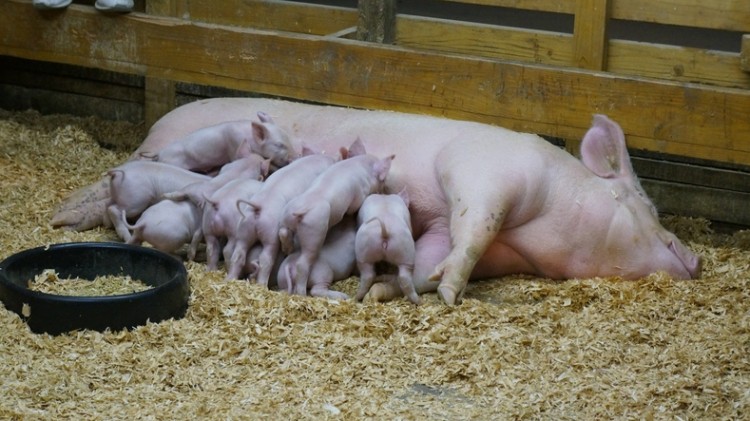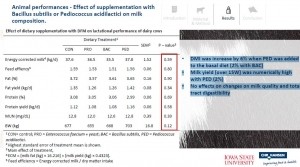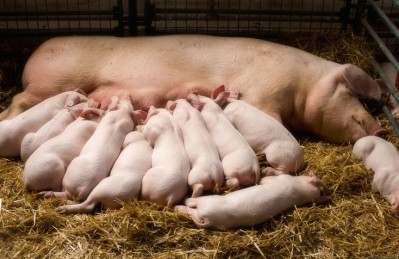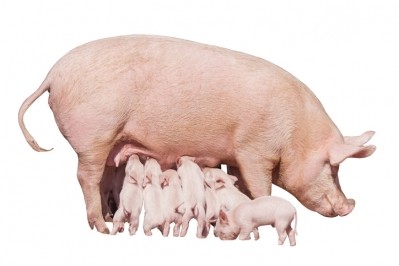Piglet gut health and cow milk yields on Chr. Hansen’s radar

Its testing of the two new microbial strains show they can inhibit both Clostridia perfringens and E.coli – an interesting finding as only a few Bacillus sp. strains are safe and effective against both pathogens, said the producer.
Bea Nielsen, senior team leader, Chr. Hansen animal health innovation, who presented on the piglet strains at MIFFI conference earlier this month, said the migration away from zinc oxide in the EU swine sector was one of the drivers for the development of the piglet targeted probiotic.
The pig product is currently being evaluated by the European Feed Safety Authority (EFSA). The expectation, she said, is that they will be on the market in Europe in the near future.
In terms of how the new strains for piglets differ from what went before, and why the product was developed, she told us:
“The new strains for piglets were selected for their ability to inhibit pathogenic E.coli. Weaning diarrhea is a huge challenge in the swine business and E.coli is one of the most relevant pathogens that causes weaning diarrhea.”
Screening
It is difficult for microbes to inhibit E. coli but that was the challenge the Chr. Hansen team set themselves.
“We have a screening procedure, where we start with up to a thousand strains that we have in our database. So we screen them for a lot of parameters, basic ones such as seeing how they grow in the different media and in the different temperatures, and then, also, for different functionalities like enzyme production and pathogen inhibition and, of course, for safety. It is important that they are safe (i.e. that they don’t harbor antibiotic resistance genes) and not all strains are - you have to be sure about that.
“Then we narrow down our strain selection and have a closer look at them, assessing more pathogens and more functionalities.
“We start in a very controlled environment, where we really try to find out what the strain is capable of doing, and then we go [deeper] and make some assays that include feed so, in that way, we get closer to the real world. Then we do animal studies.”
Production trials determine if the strains can improve ADG and FCR: “We have run more than 10 trials in piglets looking at the production parameters.”
Summarizing the key findings from trials carried out with these piglet probiotics, she said: “The strains showed E.coli inhibition in the lab and these functionalities were confirmed by an in-vivo piglet trial at Freie Universitaet Berlin where E.coli challenged piglets showed better fecal score and higher dry matter content - less diarrhea - when the new strains were added to the feed.”
In terms of their use in feed manufacturing, the Bacillus strains can be added before pelleting, as they are heat stable, she said.
Strains from healthy animals under stressed conditions
A major topic of discussion among probiotic developers is how to find the most effective microbial strains for use in animal production.
One of the strains came from a healthy and highly productive cow under stress conditions that was isolated as a part of the work at Chr. Hansen to develop new dairy cattle probiotic development, said Nielsen.

“One strategy is that you go into the animals that are stressed but that still have the best performance and you, then, isolate strains from there. Then you go into the lab, screen them for different parameters, and find the best strain that way.”
The team has been investigating certain strains for effectiveness in terms of production and health parameters in dairy cattle such as increased milk yield, nutrient digestibility, pathogen inhibition and immune status, she said. The two strains assessed, so far, in this regard include Pediococcus acidilactici (PED) and Bacillus subtilis (BAC).
Yeast removal
“We have a product [for dairy cattle] that includes yeast, yeast is very commonly used in the cattle industry. The idea was, actually, to find other technologies without yeast. We wanted to use our knowledge about microbes to solve the pathogenic challenges on the farms.”
In the first in-vivo trial on the PED and BAC strains, undertaken with Iowa State University, the researchers saw that PED, in particular, could increase milk production.
The problem with in-vivo trials, though, is that that team can see a production increase but often they don’t know why, said Nielsen.
“However, we did see a significant effect on some parameters. Sometimes, when you run these production trials, you can have the possibility to do a few mode of action studies, and, here, we took some serum samples, so we could get some data on the immune status where we saw a very significant effect. Immune data can be a little difficult to interpret or to understand, but, in this particular trial, we had heat stress. Our hypothesis is that the animals were under stressful conditions, and, due to an activated immune system, they were better prepared to counteract the heat stress.”
The team is continuing to do further production trials and is trying to understand the mode of action of the PED and BAC strains, but it is also evaluating other bacteria to find the most effective ones for higher milk yields and dairy cow health benefits. “We are still in the development phase. We are still looking at other strains.”
The US dairy cattle segment will be the initial target market for that product when it is commercially ready, she added. “Europe will follow.”












